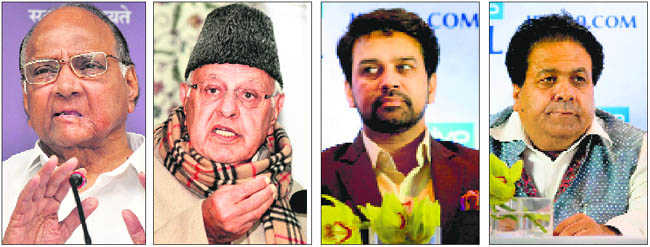Rohit Mahajan
Tribune News Service
chandigarh, january 5
Is the BCCI willing, or will it have to be forced into willingness?
That’s the most important question that comes up after the release of the Justice Lodha Committee report.
The report recommends radical structural changes in the BCCI. These changes have the potential to forever change the BCCI and Indian cricket — and all for the better.
Politician and government servants
The removal of ministers and government servants from administration is an excellent recommendation. Politics dirties cricket. Let’s consider the northern region only — in Jammu and Kashmir, Himachal Pradesh, Rajasthan and Delhi, politicians are wrangling for the control of cricket. They are fighting each other in the High Courts of these states. A senior politician of the stature of Farooq Abdullah declared that he would “fight till my death” to regain control of the Jammu and Kashmir Cricket Association. “Fight till my death” in order to continue to head the JKCA, which he already headed for 35 years in a row? This is farcical.
The Lodha Committee also proposes a limit on the age and tenure of the officials. Niranjan Shah has been heading the Rajkot Cricket Association since the early 1970s, Arun Jaitley headed the Delhi association for close to 14 years in a row, and Anurag Thakur has headed the Himachal Pradesh Cricket Association since 2000.
These are the kind of men who would have to decide on whether to implement the Lodha Committee recommendations. Will they cut the branch they’re sitting on?
The BCCI won't like this recommendation
Civil sports officials
The recommendation to bar government servants from cricket administration is also good. Civil servants (mostly IAS, IPS and state administrative officers) occupy positions not just in cricket but in all sports associations, at the state and national level.
In the past, the Central Government has considered “the need for curbing the tendency on the part of a government servant to seek elective office in sports federations”. The Central Services conduct rules state that “no Government servant should be allowed to hold elective office in any sports association/federation for a term of more than four years, or for one term whichever is less”. The Justice Lodha Committee takes it further in the case of the BCCI. Government servants do have their hands full of official work, should they be distracted from their primary job due to the politics in sports?
For example, a senior IAS officer in Rajasthan was the right-hand man of Lalit Modi in the Rajasthan Cricket Association (RCA). Eventually, they fell out and became enemies, and a long legal case ensued. Surely, government servants have more important business to attend to?
No top officials in the BCCI are govt servants, so there’s a chance that this recommendation will be accepted.
Player Association
The BCCI has fought tooth and nail to kill dissent among the players. India is the only big cricket-playing country that doesn’t have a player association. A few years ago, in 2002, a player association did come up. The Indian Cricket Players Association (ICPA) had MAK Pataudi as president and Arun Lal as secretary, and included Sachin Tendulkar, Rahul Dravid, Sourav Ganguly, Anil Kumble and Ravi Shastri. Nothing came of it — the players were either silenced or incorporated into the system.
The same had happened to a player association formed in the 1970s. In 1989, too, there were moves to form an association after the BCCI’s penalty on several leading cricketers who had played unofficial exhibition matches in the US. It fizzled out, too.
The BCCI doesn’t recognise a player association because it doesn’t like dissent. And in the absence of an association, the players, even the most powerful ones, don’t dare to speak up. The BCCI says that the players are happy because they’re looked after well, and don’t need an association.
Going by the past record, the BCCI will hate this one.
RTI Act
The BCCI has consistently fought being brought under the purview of the Right to Information Act (RTI). A case had been filed with the Central Information Commission (CIC) for this, and that case has dragged on for several years. In 2011, there were hopes that a verdict would be out soon — however, the BCCI obtained a stay order from the Madras High Court. There has been no progress since.
The BCCI would hate this recommendation.
Selectors, one vote
The Lodha Committee has recommended that the number of selectors in the national selection committee be cut down from five to three. Several past selectors have stated that having only three selectors for a large country, with over 25 first class teams, is not practicable. They could be right.
Another important recommendation pertains to one state having only one vote. This does make sense. States like Gujarat and Maharashtra have three votes, while West Bengal and Andhra Pradesh have two votes each.
Also, the Lodha Committee recommends reducing the status of some associations to that of an ‘associate’ member, without a vote in the BCCI. This seems unfair in case of several associations (Hyderabad, Rajkot, Vidarbha) which have a long history and tradition of cricket.
This is likely to be opposed by the BCCI officials, too.
Unlock Exclusive Insights with The Tribune Premium
Take your experience further with Premium access.
Thought-provoking Opinions, Expert Analysis, In-depth Insights and other Member Only Benefits
Already a Member? Sign In Now










